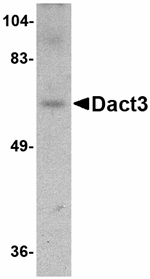The Wnt signaling cascade is a conserved process in multicellular animals that plays important roles during development and can contribute to cancer and other diseases. Many members of this pathway are also expressed in the postnatal tissues such as brain. One such protein is Dact3, a member of the Dact protein family that was initially identified through binding to Disheveled (Dvl), a cytoplasmic protein essential to Wnt signaling. Dact3 is expressed in the ventral region of maturing somites, limb bud and branchial arch mesenchyme, embryonic CNS, and the adult brain. Recent evidence shows that Dact3 acts as a negative regulator Wnt/beta-catenin signaling that is repressed at the transcriptional level in colorectal cancer and this repression is associated with bivalent histone modifications. This repression can be reversed by pharmacological agents that targets both histone methylation and deacetylation, suggesting that Dact3 may be a potential target for therapeutic treatment of this cancer. At least three isoforms of Dact3 are known to exist.

